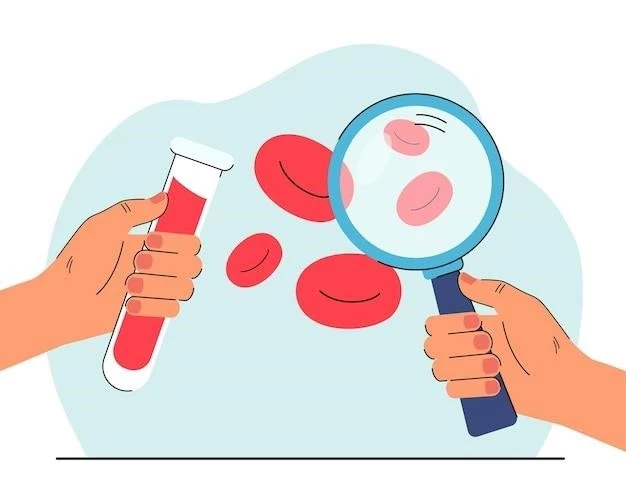Causes of Blood Coagulation Disorders
Having an understanding of the causes of blood coagulation disorders is crucial
for managing your condition effectively․ Genetic factors‚ acquired conditions‚
and medications can all play a role in disrupting normal blood clotting․
– Genetic Factors
Genetic factors can significantly impact your risk of developing blood coagulation disorders․ Inherited gene mutations can affect the production of clotting proteins‚ leading to abnormal blood clotting mechanisms․ It is important to be aware of your family history and consult with a healthcare provider to assess genetic predispositions․
– Acquired Conditions
Acquired conditions like liver disease‚ vitamin K deficiency‚ and certain infections can disrupt the normal blood clotting process․ It is essential to address underlying health issues promptly to prevent complications related to blood coagulation disorders․ Consult with a healthcare provider for proper diagnosis and treatment․
– Medications
Certain medications like blood thinners‚ aspirin‚ and chemotherapy drugs can affect blood clotting mechanisms‚ increasing the risk of coagulation disorders․ It is vital to inform your healthcare provider about all medications you are taking to prevent potential complications․ Adjustments in medication dosage may be necessary under medical supervision․
Symptoms of Blood Coagulation Disorders
Recognizing symptoms like unexplained bruising‚ excessive bleeding‚ and frequent nosebleeds is crucial for early detection and proper management of blood coagulation disorders․
– Unexplained Bruising
Unexplained bruising‚ especially in areas not prone to injury‚ can be a sign of a blood coagulation disorder․ It is essential to monitor bruising patterns and seek medical advice if you notice unusual or recurrent bruises to determine the underlying cause․
Experiencing excessive bleeding from minor cuts or mouth/gum bleeding may indicate a blood coagulation disorder․ It is essential to pay attention to bleeding episodes‚ seek immediate medical attention for prolonged or uncontrolled bleeding‚ and follow your healthcare provider’s guidance for proper management․
– Frequent Nosebleeds
Frequent nosebleeds‚ especially without a clear cause or difficulty stopping the bleeding‚ can be a symptom of an underlying blood coagulation disorder․ It is important to monitor the frequency and duration of nosebleeds‚ seek medical evaluation‚ and follow recommended treatment to manage the condition effectively․
Diagnosis and Treatment of Blood Coagulation Disorders
Timely diagnosis through blood tests like PT and aPTT is key to starting effective
treatment․ Medications like anticoagulants and surgical interventions may be
prescribed based on the underlying cause of the disorder․
– Blood Tests (PT‚ aPTT)
Blood tests such as Prothrombin Time (PT) and Activated Partial Thromboplastin Time (aPTT) are crucial for diagnosing blood coagulation disorders․ These tests help assess clotting factors and determine the appropriate treatment plan․ It is important to follow healthcare provider recommendations for accurate diagnosis and effective management․
– Medications (Anticoagulants)
Anticoagulants are commonly prescribed to manage blood coagulation disorders by preventing excessive blood clotting․ These medications help reduce the risk of clot formation and associated complications․ It is essential to take anticoagulants as directed by your healthcare provider and attend regular monitoring to ensure the effectiveness and safety of treatment․
– Surgical Interventions
In some cases of blood coagulation disorders‚ surgical interventions like platelet transfusions or joint replacements may be necessary to manage complications․ It is crucial to discuss surgical options with your healthcare provider‚ understand the risks and benefits‚ and participate in post-operative care for optimal recovery․
Prevention of Blood Coagulation Disorders
Embracing a healthy diet‚ engaging in regular exercise‚ and avoiding smoking are key aspects of preventing blood coagulation disorders․ Prioritizing these lifestyle changes can help maintain optimal blood clotting function and overall health․
– Healthy Diet
Adopting a balanced diet rich in fruits‚ vegetables‚ whole grains‚ and lean proteins can support normal blood clotting function․ Including foods high in vitamin K‚ omega-3 fatty acids‚ and antioxidants can contribute to overall vascular health and help prevent blood coagulation disorders․ Consult with a healthcare provider or a nutritionist for personalized dietary recommendations․
– Regular Exercise
Engaging in regular physical activity promotes cardiovascular health and reduces the risk of blood coagulation disorders․ Activities like walking‚ swimming‚ or yoga can improve circulation‚ maintain healthy blood vessels‚ and contribute to overall wellness․ Consult with a healthcare provider to determine the most suitable exercise regimen based on your individual health needs․
– Avoidance of Smoking
Avoiding smoking and secondhand smoke is crucial for preventing blood coagulation disorders․ Tobacco products can harm blood vessels‚ impair circulation‚ and increase the risk of clot formation․ Quitting smoking can significantly improve cardiovascular health and reduce the likelihood of developing coagulation-related complications․ Seek support from healthcare professionals or smoking cessation programs for successful smoking cessation․
Types of Blood Coagulation Disorders
Understanding the different types of blood coagulation disorders like Hemophilia A and B‚ Von Willebrand Disease‚ and Thrombophilia is essential for proper management and treatment․ Each type has specific characteristics that require personalized care and monitoring․
– Hemophilia A and B
Hemophilia A and B are inherited blood disorders characterized by a deficiency in clotting factors․ Individuals with these conditions are prone to prolonged bleeding episodes․ Proper treatment involves clotting factor replacement therapy‚ regular monitoring‚ and injury prevention strategies․ It is important to work closely with healthcare providers specializing in hemophilia care for optimal management․
– Von Willebrand Disease
Von Willebrand Disease is a genetic disorder that affects blood clotting due to a deficiency or dysfunction of von Willebrand factor․ Symptoms may include easy bruising‚ prolonged bleeding‚ and nosebleeds․ Treatment often involves medications to increase von Willebrand factor levels and manage bleeding episodes․ Regular check-ups and adherence to treatment plans are vital for individuals with this condition․
– Thrombophilia
Thrombophilia is a condition characterized by an increased tendency to form blood clots․ It can be genetic or acquired‚ posing risks of clot-related complications․ Treatment may involve anticoagulant medications to prevent clot formation․ Individuals with thrombophilia should maintain regular follow-ups‚ adopt lifestyle changes‚ and seek immediate medical help in case of symptoms like chest pain or breathing difficulties․

Complications of Blood Coagulation Disorders
Understanding the complications of blood coagulation disorders like excessive bleeding‚ blood clots‚ and organ damage is crucial for early intervention and management․ Monitoring symptoms and seeking prompt medical care are essential for preventing severe outcomes․
– Excessive Bleeding
Excessive bleeding‚ a common complication of blood coagulation disorders‚ can lead to anemia and other serious health issues․ Timely medical intervention‚ adherence to treatment plans‚ and measures to prevent injuries are essential in managing excessive bleeding episodes effectively․ Always consult with healthcare providers for guidance and support․
– Blood Clots
Blood clots are serious complications of blood coagulation disorders that can lead to heart attacks‚ strokes‚ or pulmonary embolism․ It is crucial to be aware of symptoms like swelling‚ pain‚ or shortness of breath and seek immediate medical attention․ Preventive measures‚ such as staying hydrated‚ moving around during long periods of immobility‚ and following medication regimens‚ are vital in reducing clotting risks․
– Organ Damage
Organ damage can result from untreated blood coagulation disorders‚ affecting vital organs like the brain‚ heart‚ or kidneys․ Monitoring symptoms‚ adhering to treatment plans‚ and regular check-ups are essential in preventing organ damage․ Prompt medical intervention and lifestyle modifications can help reduce the risk of complications and preserve organ function․
Lifestyle Tips for Blood Coagulation Disorders
Incorporate gentle physical activities‚ focus on injury prevention‚ and maintain regular monitoring with your healthcare provider to manage blood coagulation disorders effectively․
– Gentle Physical Activities
Engaging in gentle physical activities like walking‚ swimming‚ or yoga can improve blood flow and overall well-being without causing excessive strain․ Regular movement is essential for cardiovascular health and can help prevent clotting complications associated with blood coagulation disorders․ Consult with your healthcare provider to determine suitable exercise routines․
– Injury Prevention
Preventing injuries is crucial for individuals with blood coagulation disorders to minimize bleeding risks․ Avoid activities with a high risk of trauma‚ use protective gear when needed‚ and take precautions to prevent accidents․ Promptly address any injuries‚ even minor ones‚ to prevent complications and prioritize safety in daily activities to maintain optimal health․
– Regular Monitoring with Healthcare Provider
Regular monitoring with your healthcare provider is essential for managing blood coagulation disorders․ Routine check-ups‚ blood tests‚ and discussions about symptoms or changes in health can help track the condition’s progression‚ adjust treatment plans as needed‚ and ensure optimal care․ Collaborate closely with your medical team to maintain overall well-being and manage your condition effectively․
Research Advances in Blood Coagulation Disorders
Stay informed about gene therapy‚ novel anticoagulant medications‚ and targeted therapies for specific disorders to be at the forefront of advancements in blood coagulation disorder treatments․
– Gene Therapy
Explore the evolving realm of gene therapy for blood coagulation disorders‚ offering promising treatments that target underlying genetic factors․ Stay up-to-date on research breakthroughs and discuss with your healthcare provider potential options for personalized gene-based therapies to manage your condition effectively․
– Novel Anticoagulant Medications
Stay informed about the latest advancements in novel anticoagulant medications‚ offering alternative options for managing blood coagulation disorders․ Discuss with your healthcare provider about potential benefits‚ risks‚ and individualized treatment plans involving these emerging therapies to enhance your care and quality of life․
– Targeted Therapies for Specific Disorders
Explore targeted therapies tailored to specific blood coagulation disorders‚ offering precise and effective treatment approaches․ Keep abreast of advancements in personalized medicine and collaborate with healthcare providers to explore targeted therapies that address the unique characteristics of your specific condition for optimal management and improved outcomes․
